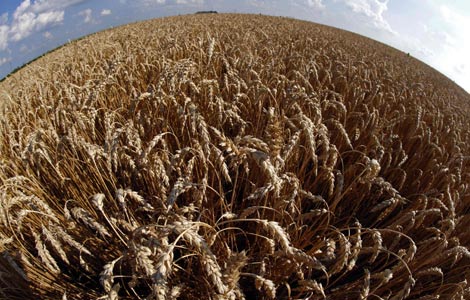World Bank says global food prices fell
Updated: 2013-07-26 07:59
(Agencies)
|
||||||||
|
 |
|
Stalks of soft red winter wheat are seen on a farm in Dixon, Illinois, in this file picture taken July 16, 2013. [Photo/Agencies] |
The World Bank's Food Price Index showed international prices of wheat fell by 2 percent, sugar by 6 percent, soybean oil by 11 percent, and maize, or corn, by 1 percent during the four-month period between February and June.
The index, which weighs export prices of food, fats and oils, grains, and other foods in nominal U.S. dollars, fell by 2 percent.
Improved weather conditions after last year's droughts helped bolster the production of wheat. The bank said it expects good harvests from the major producers to continue as long as unfavorable weather in northern and central Europe, Russia and China does not drag on production.
Global maize production is expected to reach a record high this year, according to the report, partly driven by a revival in demand from U.S. ethanol producers.
While prices have stabilized recently, the volatility of food prices in recent years has prompted developing countries with high poverty and weak safety nets to respond by ratcheting up consumer food subsidies, the poverty-fighting institution said.
The World Bank and the International Monetary Fund have made a big push in the past year to urge countries to scrap subsidies on consumer food to ease pressures on government budgets and free up more funds for health and education spending.
Both institutions have also questioned whether such subsidies truly improve poverty - as they can often go to large-scale farmers or well-connected people instead of the poorest.
"Poorly designed food subsidy programs that lack transparency and accountability in implementation do not benefit poor people," said Jaime Saavedra, active vice president for poverty reduction and economic management at the World Bank. "These programs can be very costly and prone to corruption, and waste scarce fiscal resources."
According to the report, more direct forms of transfers, such as food stamps and public works, are more effective in helping the poor.

 Top DPRK leader meets Chinese vice-president
Top DPRK leader meets Chinese vice-president
 Bo Xilai indicted for corruption
Bo Xilai indicted for corruption
 Korean War veterans return to peninsula
Korean War veterans return to peninsula
 Tourist safety a priority in S China Sea
Tourist safety a priority in S China Sea
 Death toll in Spain train crash rises to 77
Death toll in Spain train crash rises to 77
 Royal baby named George Alexander Louis
Royal baby named George Alexander Louis
 'The Grandmaster' takes center stage
'The Grandmaster' takes center stage
 Fewer Chinese consumers picking Apple's iPhone
Fewer Chinese consumers picking Apple's iPhone
Most Viewed
Editor's Picks

|

|

|

|

|

|
Today's Top News
Japanese PM unlikely to visit Yasukuni Shrine
Girl, 2, thrown to ground; suspect detained
Crackdown a bitter drug to herald changes
Indictment shows CPC's stance on corruption
China's VAT reform to benefit more businesses
Yum won't chicken out from expansion
FDI to maintain growth in H2
Top DPRK leader meets Chinese vice-president
US Weekly

|

|







